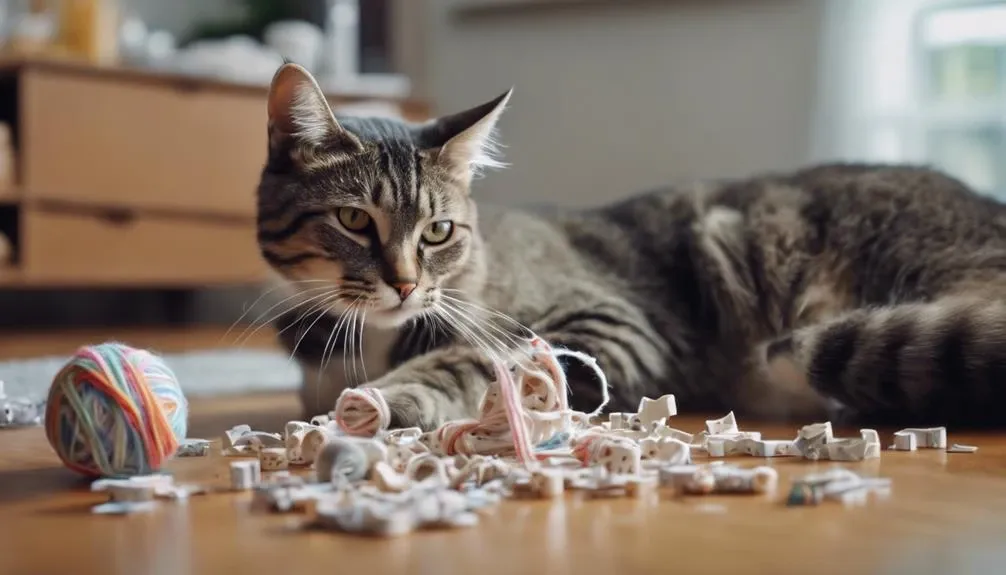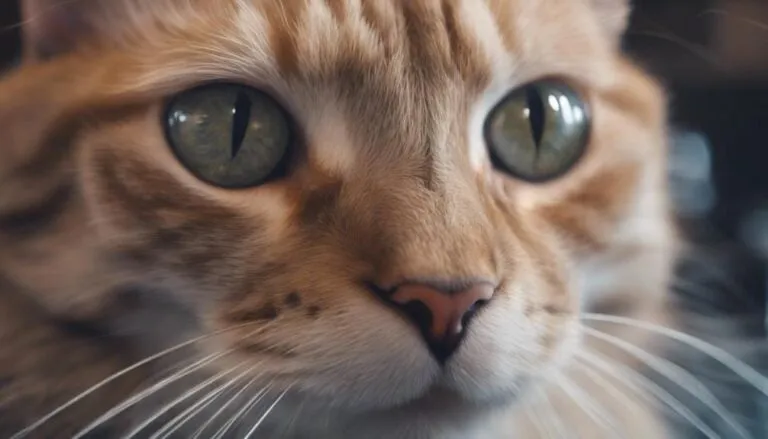The Best Fluffy Pancakes recipe you will fall in love with. Full of tips and tricks to help you make the best pancakes.

Wondering if your feline friend is secretly a genius? Have you ever pondered how to assess your cat's cognitive abilities without formal testing? Understanding your cat's intelligence can not only deepen your bond but also help tailor interactions to suit their mental prowess.
From problem-solving challenges to social interaction assessments, there are various ways to uncover your cat's hidden intellectual potential right in your own home. So, how can you unlock the mysteries of your cat's mind and discover their true brilliance?
Key Takeaways
- Observe behavior and reactions to stimuli to assess intelligence
- Engage in problem-solving challenges like food puzzles and interactive toys
- Assess social interaction for insights into cognitive abilities
- Test memory retention, adaptability, and problem-solving skills with various activities
Observing Behavior and Reactions
When assessing your cat's intelligence at home, begin by closely observing their behavior and reactions to various stimuli. One way to evaluate your cat's problem-solving skills is by observing how they react to hidden toys. Do they actively search for the toys, showing curiosity and intelligence?
Cats that engage in exploring their environment demonstrate a higher level of intelligence as they display adaptability to new and unfamiliar situations. Another aspect to consider is memory retention. Notice if your cat remembers the location of hidden treats or toys, indicating a good memory.
Problem-Solving Challenges
To assess your cat's problem-solving abilities effectively, engage them in food puzzles and interactive toys that challenge their cognitive skills. Cats are smart creatures that enjoy a good challenge. Here are some ways to test and improve your feline friend's problem-solving skills:
- Food Puzzles: Provide your cat with puzzles that require them to think and strategize to access their treats.
- Interactive Toys: Use toys that dispense treats when manipulated correctly, encouraging your cat to problem-solve.
- Hide and Seek: Play games where you hide toys or treats for your cat to find, testing their ability to locate hidden objects.
- Teaching Tricks: Teach your cat tricks like high fives or jumping through hoops to see how quickly they learn and apply new skills.
- Observation: Pay attention to how your cat adapts to new situations or environments, as this can showcase their intelligence and adaptability.
Social Interaction Assessments
Assess your cat's intelligence through social interactions by observing their responses to your presence and interactions. Evaluate their social engagement by noting if they seek attention, initiate play, or respond to your social cues and commands. Monitoring your cat's social behavior provides insights into their emotional intelligence and bonding capabilities. By observing how your cat interacts with you, you can gain a better understanding of their cognitive abilities, social learning capacity, and communication skills.
During social interaction assessments, pay attention to how your cat responds to different stimuli and situations. Note whether they show interest in engaging with you, understand simple commands, or exhibit behaviors that suggest a strong emotional connection. These observations can offer valuable insights into your cat's intelligence and social capabilities. Through home assessments focused on social interactions, you can uncover important information about your cat's cognitive strengths and areas for potential growth.
Cognitive Ability Insights
Cats' cognitive abilities showcase remarkable problem-solving skills and emotional intelligence, evident through their understanding of object permanence and social responses. When assessing your cat's cognitive ability, consider the following insights:
- Object Permanence: Cats grasp the concept of object permanence, enabling them to find hidden objects and understand nonapparent items.
- Spatial and Vocal Clues: By interpreting spatial and vocal cues, cats demonstrate cognitive understanding of their surroundings.
- Emotional Bonds: Forming emotional bonds indicates higher cognitive abilities and a capacity for social responses.
- Problem-Solving Skills: Tests like hiding treats under objects can reveal your cat's problem-solving abilities.
- Adaptability: Observing how your cat reacts to new stimuli can provide valuable insights into their cognitive flexibility and adaptability.
Intelligence Testing Activities
Begin by engaging your cat in various intelligence testing activities to assess their cognitive abilities and problem-solving skills. Conduct simple tests like hiding treats or toys to observe how your cat approaches and solves the task. Test their memory retention by increasing time intervals between learning sessions to see how well they remember where items are placed. Measure your cat's adaptability by introducing new objects or situations and observing how they react and adjust. Interact with your cat in different ways to evaluate their social intelligence and emotional responses to stimuli. Additionally, engage your cat in puzzle toys or food puzzles to stimulate their mental abilities and test their cognitive skills.
| Intelligence Testing Activities |
|---|
| 1. Hide treats or toys |
| 2. Test memory retention |
| 3. Measure adaptability |
| 4. Interact for social intelligence |
| 5. Use puzzle toys for cognitive skills |
Frequently Asked Questions
How Can I Test My Cat's Intelligence?
To test your cat's intelligence, engage in activities like puzzle games, food challenges, hide and seek, memory tests, interactive toys, clicker training, problem-solving tasks, social interactions, communication cues, and environmental enrichment. These provide valuable insights into your cat's cognitive abilities.
How Do You Know if Your Cat Has a High Iq?
To determine if your cat has a high IQ, observe their problem-solving skills with puzzle toys, memory tests with hidden treats, ability to learn tricks, adaptability to new environments, social interactions, and observational skills.
What Is the IQ of a House Cat?
To assess a house cat's IQ, consider intelligence tests, puzzle challenges, problem-solving tasks, learning ability, memory skills, behavioral observations, social interactions, environmental enrichment, training methods, and mental stimulation. These factors collectively reveal your cat's cognitive abilities.
What Is a Cat's IQ Equivalent to a Human's?
A cat's IQ, akin to a 2-year-old child, showcases problem-solving skills, adaptability, and memory retention. When comparing species, their cognitive abilities align with a toddler's development. Observing their behavior in various situations reveals their mental capacity.
Conclusion
In conclusion, by observing your cat's behavior, presenting problem-solving challenges, assessing social interactions, gaining insights into their cognitive abilities, and engaging in intelligence testing activities, you can effectively measure your cat's intelligence at home.
These interactive activities not only provide mental stimulation but also strengthen the bond between you and your feline companion.
Understanding your cat's intelligence can help tailor their environment and interactions to ensure their well-being and happiness.








